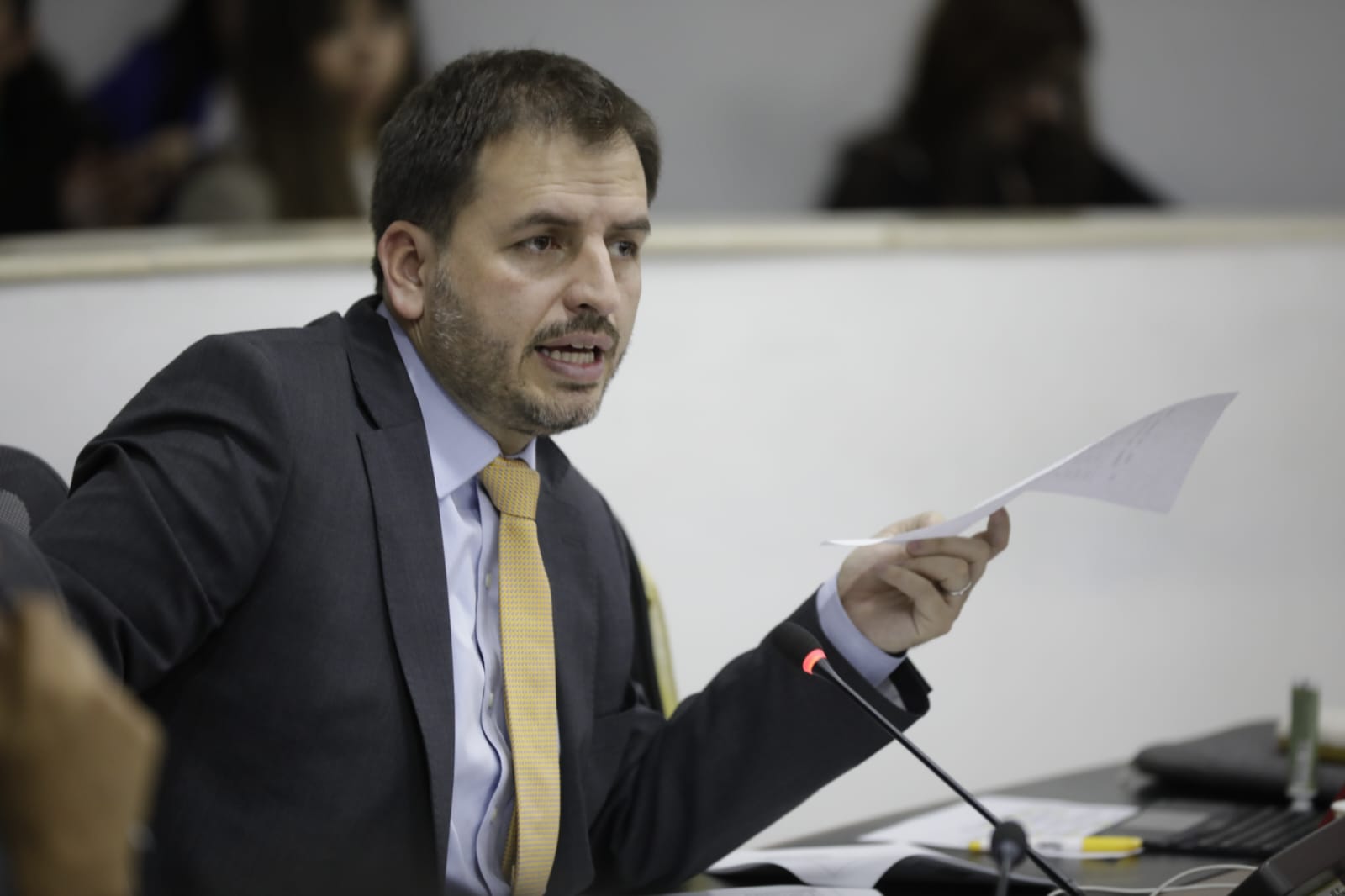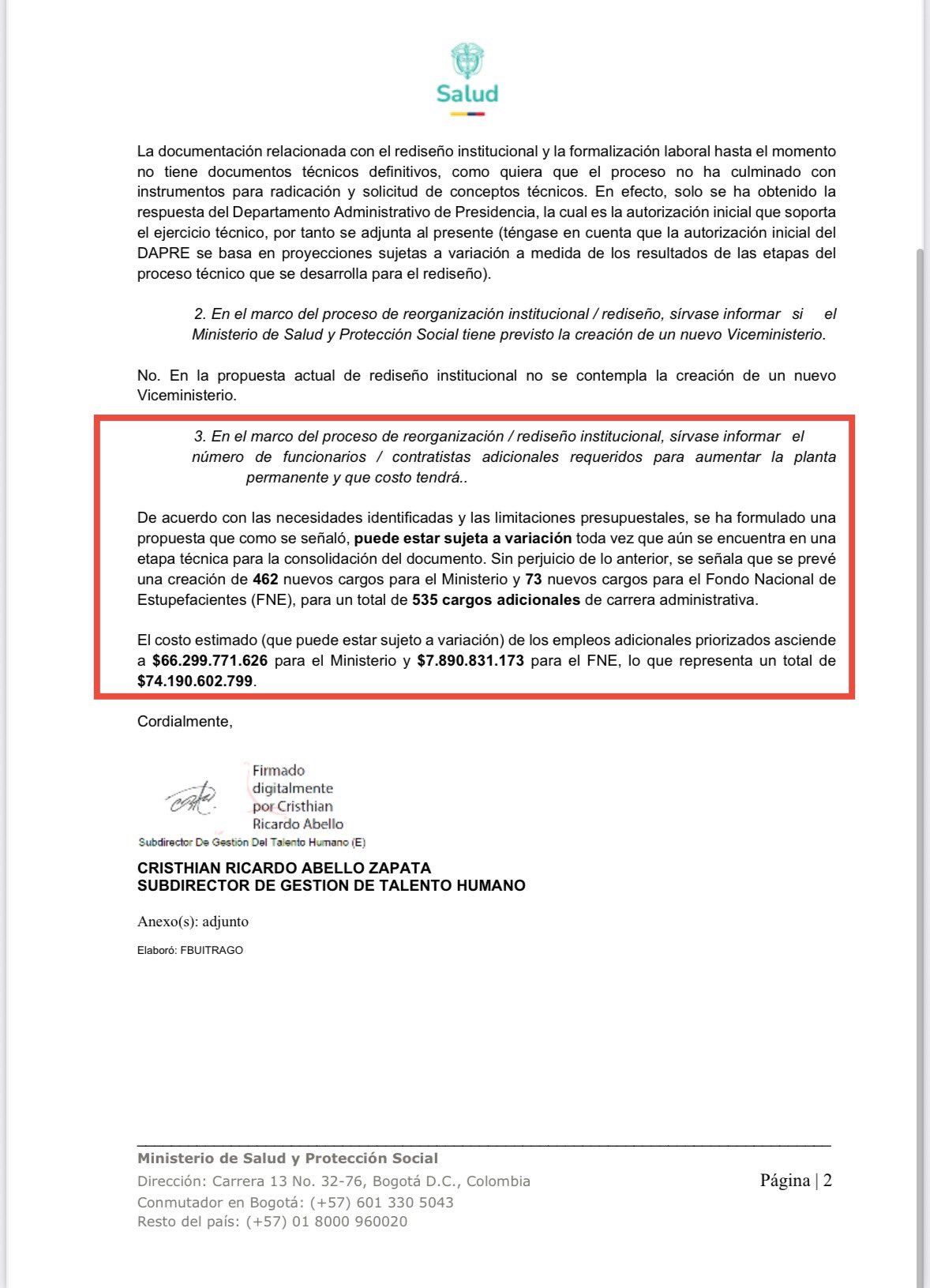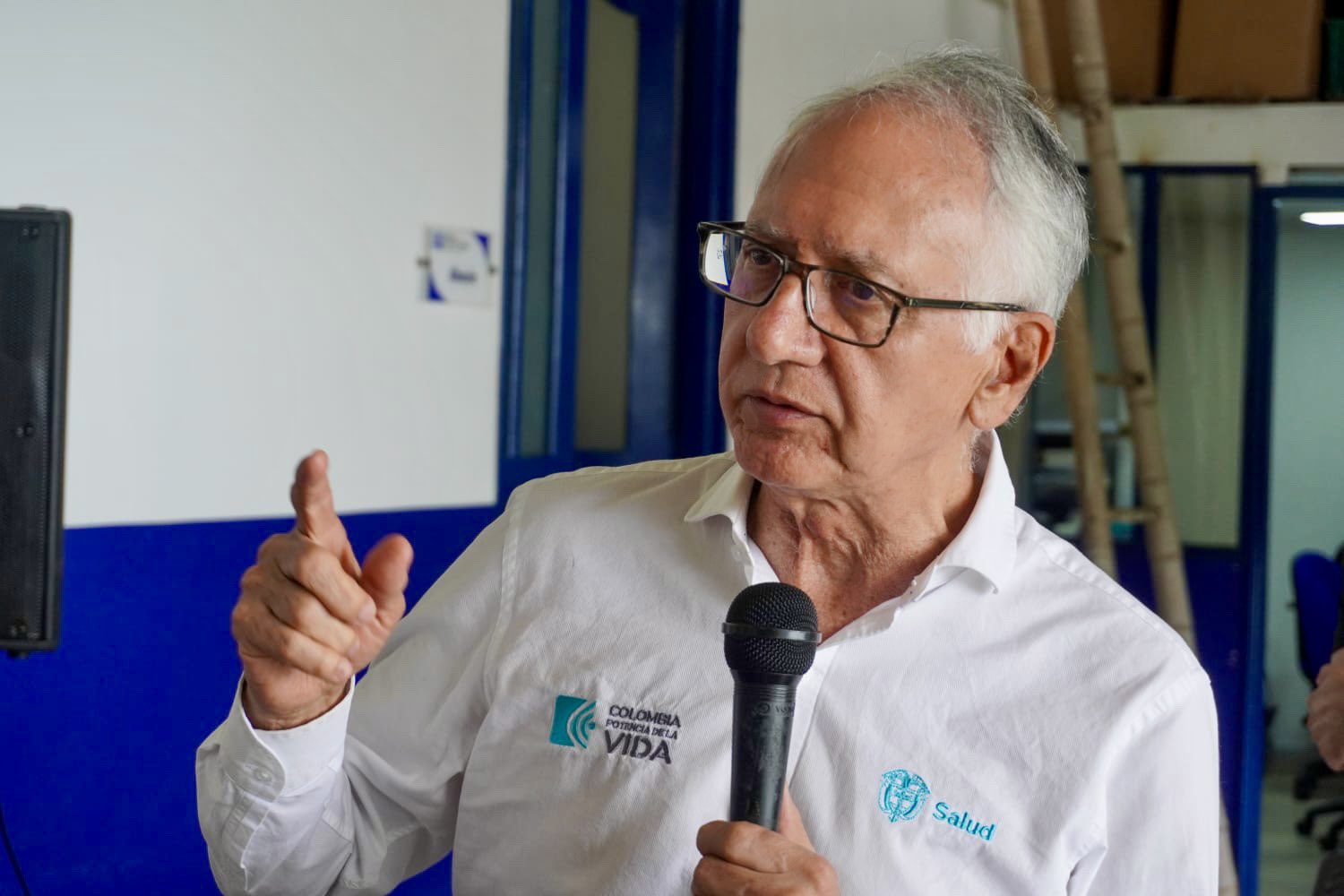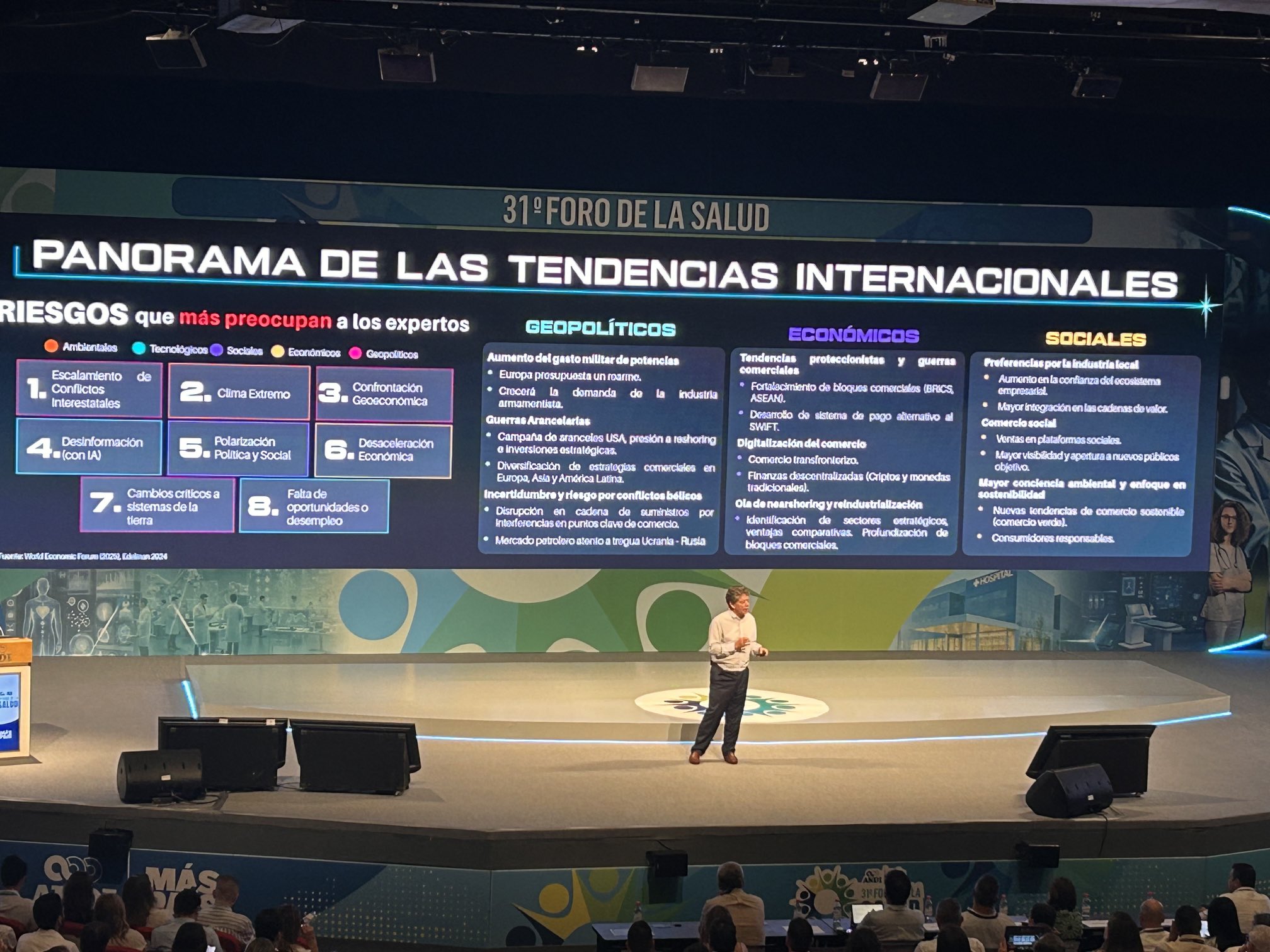In the midst of a system crisis due to a lack of resources, the Ministry of Health is expected to create 535 new positions in the entity.

Amid a severe financial crisis that has the Colombian healthcare system on the ropes, the Ministry of Health is reportedly working to create 535 new administrative career positions as part of an institutional reorganization, which would cost the entity $74.19 billion pesos annually. This, according to a complaint filed by Andrés Forero, a House representative for the Democratic Center party.

Andrés Forero, representative of the Democratic Center. Photo: Sergio Acero. EL TIEMPO
The congressman revealed a petition in which the Deputy Director of Human Talent Management at the Ministry of Health, Cristhian Abello, explained that, based on the "identified needs and budgetary limitations," an institutional reorganization process is being proposed that would require the hiring of 462 people for the Ministry of Health and 73 for the National Narcotics Fund.
As previously reported, the institutional redesign and labor formalization process does not yet have definitive technical documentation, as it has not been fully structured. However, it has already been approved by the Administrative Department of the Presidency (Dapre).
"A proposal has been formulated which, as noted, may be subject to change as it is still in the technical stage of document consolidation. Notwithstanding the foregoing, it is noted that 462 new positions are planned for the Ministry and 73 new positions for the National Narcotics Fund (FNE), for a total of 535 additional administrative career positions. The estimated cost (which may be subject to change) of the prioritized additional positions amounts to $66,299,771,626 for the Ministry and $7,890,831,173 for the FNE, representing a total of $74,190,602,799," states the response provided by Abello.

Right to petition revealed by Representative Andrés Forero. Photo: Andrés Forero
In that sense, Forero, who has been one of the congressmen who has carried out the most oversight of the health crisis from the Seventh Committee of the House of Representatives, described the bill as a "bureaucratic feast" that ignores the current crisis in the sector. "In the worst health crisis in the country's recent history, (Minister) Guillermo Alfonso Jaramillo intends to create 535 new administrative career positions. This bureaucratic feast would cost $74.19 billion a year. The government doesn't have money for medicines, but it does have money for patronage and politicking," Forero asserted.
In response, several experts and stakeholders in the health system questioned the intention to increase spending on more jobs for the Ministry at a critical time when the Constitutional Court has ruled that the Capitation Payment Unit (UPC) - established by the Government - is underfunded, while hospitals and clinics are reporting delays in payments from the EPSs, with an increase in the portfolio in those currently under the control of the Supersalud (Health Superintendency of Health), which, despite having been managing several of these private companies for over a year, has not managed to improve its indicators; on the contrary, they have been declining.

Guillermo Alfonso Jaramillo, Minister of Health. Photo: Ministry of Health
One of the first to speak out was Andrés Vecino, a specialist in health systems and health economics, who also highlighted that of the 405 new permanent professional-level positions, according to the data, 168 are "university professional," which is the lowest level for a technical institution. "They're turning the health system into a job center. The Ministry of Health is reorganizing the institution to lock in its followers beyond 2026," Vecino asserted.
For its part, the Colombian Federation of Rare Diseases asserted that this decision reflects the fact that "there is no money to save lives, but there is money to expand offices" and urged that health care not remain secondary and that patients, not bureaucracy, be prioritized.
“Very seriously, while patients are dying, the government is proposing 535 new administrative positions worth $74.19 billion a year. In the midst of a health system crisis—without medicines, with hospitals overwhelmed, and patients without care—Ministry of Health Guillermo Alfonso Jaramillo is prioritizing increasing his bureaucratic staff. Resources are scarce, but they are allocated to the Ministry's internal growth. This is a campaign investment, not a patient investment,” the organization warned.
The serious health situation At the 31st Andi Health Forum, held last week in Cartagena, the president of the association, Bruce Mac Master, emphasized that the private sector is "concerned and distressed" by the figures being recorded. According to what was revealed at the meeting, one of the most important data points is the increase in the accident rate of the Per Capita Payment Unit (UPC), which exceeded 105.1 percent in 2024. In other words, patients are spending 5.1 percent more of what each Colombian pays for their healthcare, leaving a liability that affects the system's operation.
On the other hand, the State would not be paying, increasing the nation's liabilities to the EPS, which went from $2.2 trillion in 2021 to more than $9 trillion pesos in 2024. Added to this is a widespread deterioration in the payment portfolio throughout the entire healthcare system value chain. Healthcare Provider Institutions (IPS), for their part, went from having a past-due portfolio of $1.7 trillion in 2022 to $3.6 trillion in 2025.

The Andi Health Forum was held in Cartagena from June 18 to 20. Photo: Andi
At the same time, user PQRD (Petitions, Complaints, Claims, and Reports) skyrocketed: from 996,733 in 2021 to more than 1.7 million in 2024. In the first three months of 2025, 488,863 complaints have already been registered, confirming a serious humanitarian crisis in access to and quality of services, where the main reasons are related to delays in appointments, procedures, and medical supplies.
In this regard, Mac Master was clear in pointing out that there is concern among various stakeholders about the situation. Therefore, this year, part of the Andi Health Forum was dedicated to holding workshops in which system stakeholders and experts proposed urgent actions to be implemented. “The idea is for us to sit down and develop solutions. Are we worried? Yes. Are we anxious? Yes. But we can't stop there. Our task is to try to move Colombia forward,” the union leader added.
Environment and Health Journalist
eltiempo



%3Aformat(jpg)%3Aquality(99)%3Awatermark(f.elconfidencial.com%2Ffile%2Fbae%2Feea%2Ffde%2Fbaeeeafde1b3229287b0c008f7602058.png%2C0%2C275%2C1)%2Ff.elconfidencial.com%2Foriginal%2F61e%2F0a4%2Fa93%2F61e0a4a93be493b2555f4867af0ca5c0.jpg&w=1280&q=100)
%3Aformat(jpg)%3Aquality(99)%3Awatermark(f.elconfidencial.com%2Ffile%2Fbae%2Feea%2Ffde%2Fbaeeeafde1b3229287b0c008f7602058.png%2C0%2C275%2C1)%2Ff.elconfidencial.com%2Foriginal%2F7bb%2Fe69%2Fcd8%2F7bbe69cd8d21a343986528421038f163.jpg&w=1280&q=100)